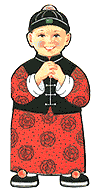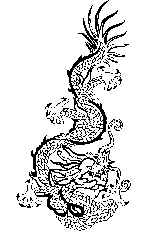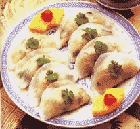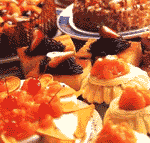|
 Click here for more words about the
Spring Festival Click here for more words about the
Spring Festival
Chinese New Year starts with the New
Moon(新月)on the first day of the new year and ends on the full moon(滿月)15 days later. The 15th day of the new
year is called the Lantern Festival(元宵節(jié)),
which is celebrated at night with lantern displays and children carrying
lanterns in a parade.
The Chinese calendar is based on a combination of lunar and solar
movements. The lunar cycle(月運周期)is about 29.5
days. In order to "catch up" with the solar calendar the Chinese insert an
extra month once every few years (seven years out of a 19-yearcycle). This
is the same as adding an extra day on leap
year (閏年). This is why, according to the solar calendar, the
Chinese New Year falls on a different date each year.
New Year's Eve and New Year's Day are celebrated as a family affair, a
time of reunion and thanksgiving. The celebration was traditionally
highlighted with a religious ceremony given in honor of Heaven and Earth(萬物),
the gods of the household and the family ancestors.
The sacrifice to the ancestors, the most vital of all the rituals(儀式), united the living members with those
who had passed away. Departed relatives are remembered with great respect
because they were responsible for laying the foundations for the fortune
and glory of the family.
The presence of the ancestors is acknowledged on New Year's Eve with a
dinner arranged for them at the family banquet table. The spirits of the
ancestors, together with the living, celebrate the onset of the New Year
as one great community. The communal feast called "surrounding the stove"
or weilu. It symbolizes family unity and honors the past and present
generations.
 The Origin of Chinese New
Year The Origin of Chinese New
Year
The Chinese New Year is now popularly known as the Spring Festival
because it starts from the Begining of Spring (the first of the
twenty-four terms in coodination with the changes of Nature). Its origin
is too old to be traced. Several explanations are hanging around. All
agree, however, that the word Nian, which in modern Chinese solely means
"year", was originally the name of a monster beast that started to prey on
people the night before the beginning of a new year.
One legend goes that the beast Nian had a very big mouth that would
swallow a great many people with one bite. People were very scared. One
day, an old man came to their rescue, offering to subdue Nian. To Nian he
said, "I hear say that you are very capable, but can you swallow the other
beasts of prey on earth instead of people who are by no means of your
worthy opponents?" So, it did swallow many of the beasts of prey on earth
that also harrassed people and their domestic animals from time to
time.
After that, the old man disappeared riding the beast Nian. He turned
out to be an immortal god. Now that Nian is gone and other beasts of prey
are also scared into forests, people begin to enjoy their peaceful life.
Before the old man left, he had told people to put up red paper
decorations on their windows and doors at each year's end to scare away
Nian in case it sneaked back again, because red is the color the beast
feared the most.
From then on, the tradition of observing the conquest of Nian is
carried on from generation to generation. The term "Guo Nian", which may
mean "Survive the Nian" becomes today "Celebrate the (New) Year" as the
word "guo" in Chinese having both the meaning of "pass-over" and
"observe". The custom of putting up red paper and firing fire-crackers to
scare away Nian should it have a chance to run loose is still around.
However, people today have long forgotten why they are doing all this,
except that they feel the color and the sound add to the excitement of the
celebration.
Traditional New Year Foods
 Probably more food is consumed during the New Year
celebrations than any other time of the year. Vast amounts of traditional
food is prepared for family and friends, as well as those close to us who
have died. Probably more food is consumed during the New Year
celebrations than any other time of the year. Vast amounts of traditional
food is prepared for family and friends, as well as those close to us who
have died.
On New Year's Day, the Chinese family will eat a vegetarian dish called
jai. Although the various ingredients in jai are root vegetables or
fibrous vegetables, many people attribute various superstitious aspects to
them.
Other foods include a whole fish, to represent togetherness and
abundance, and a chicken for prosperity. The chicken must be presented
with a head, tail and feet to symbolize completeness. Noodles should be
uncut, as they represent long life.
 In south China, the favorite and most typical dishes were nian
gao, sweet steamed glutinous rice(糯米)pudding
and zong zi (glutinous rice wrapped up in reed(蘆葦)leaves), another popular delicacy. In south China, the favorite and most typical dishes were nian
gao, sweet steamed glutinous rice(糯米)pudding
and zong zi (glutinous rice wrapped up in reed(蘆葦)leaves), another popular delicacy.
In the north, steamed-wheat bread (man tou) and small meat
dumplings were the preferred food. The tremendous amount of food prepared
at this time was meant to symbolize abundance and wealth for the
household.
The 15-Day Celebration of Chinese New Year
The first day of the Lunar New Year is "the welcoming of the gods of
the heavens and earth."Many people abstain from meat on the first day of
the new year because it is believed that this will ensure long and happy
lives for them.
On the second day, the Chinese pray to their ancestors as well as to
all the gods. They are extra kind to dogs and feed them well as it is
believed that the second day is the birthday of all dogs.
 The third and fourth days are for the sons-in-laws to
pay respect to their parents-in-law. The third and fourth days are for the sons-in-laws to
pay respect to their parents-in-law.
The fifth day is called Po Woo. On that day people stay home to welcome
the God of Wealth. No one visits families and friends on the fifth day
because it will bring both parties bad luck.
On the sixth to the 10th day, the Chinese visit their relatives and
friends freely. They also visit the temples to pray for good fortune and
health.
The seventh day of the New Year is the day for farmers to display their
produce. These farmers make a drink from seven types of vegetables to
celebrate the occasion. The seventh day is also considered the birthday of
human beings. Noodles are eaten to promote longevity and raw fish for
success.
On the eighth day the Fujian people have another family reunion dinner,
and at midnight they pray to Tian Gong, the God of Heaven.
The
ninth day is to make offerings to the Jade Emperor.
The 10th through the 12th are days that friends and relatives should be
invited for dinner. After so much rich food, on the 13th day you should
have simple rice congee and mustard greens (choi sum) to cleanse the
system.
The 14th day should be for preparations to celebrate the
Lantern Festival which is to be held on the 15th night.
Auspicious words:
|
|
|
|
|
| Treasures fill the home |
Business flourishes |
Peace all year round |
Wishing you prosperity |
|
|
|
|
|
| Harmony brings wealth |
May all your wishes come true |
Everything goes well |
The country flourishes and people live
in peace |
|
|
|
|
|
| Money and treasures will be
plentiful |
Wishing you every success
|
Promoting to a higher
position |
Safe trip wherever you go
|
|